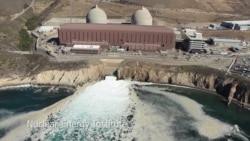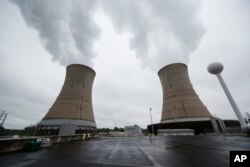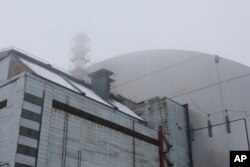Kristin Zaitz is confident that her nuclear power plant is safe.
Zaitz, an engineering manager, was at Diablo Canyon Power Plant during both her pregnancies and has scuba dived to inspect the plant, which hugs the California coast. Zaitz wears a pendant with a tiny bit of uranium inside, an item that tends to invite questions.
“We all have our perceptions of nuclear,” Zaitz said.
In a few years, Diablo Canyon will close, part of a trend nationwide. The availability of cheap natural gas and greater energy efficiency has reduced demand for nuclear power in recent years. Add to that ongoing concerns about public safety, such as those raised by memories of disasters at nuclear plants in Fukushima, Japan, Chernobyl in Ukraine (then part of the Soviet Union) and Three Mile Island in the United States.
Nuclear is 'cleaner' than fossil fuels
Supporters of nuclear power plants say that when a reactor-based generating station closes, not enough wind and solar power is available to make up the difference. They lament that energy companies tend to turn instead to fossil fuels — coal and natural gas — which produce environmentally harmful emissions.
Zaitz and her co-worker Heather Matteson, a reactor operator, started Mothers for Nuclear, their effort to get the word out that nuclear power is clean, safe and better for the environment than some alternative energy sources.
“I went into the plant very skeptical of nuclear and being scared of it,” said Matteson. “It took me six to seven years to really feel like this is something good for the environment. I don't want people to take six to seven years to make that decision. We don't have that long.”
Matteson, too, wears the uranium necklace as a conversation starter. “Nuclear is fun,” she said. Is there any radiation emitted by the pendant? “There's slightly more than from a banana,” she conceded.
Women seen as powerful advocates
Industry experts say that women who work in nuclear power can be powerful advocates for nuclear. They can help change attitudes of other women who tend to be more skeptical than men about nuclear energy's benefits.
At the recent U.S. Women in Nuclear conference in San Francisco, women working in the industry talked about how more should be done to make nuclear power's case to the public, and how they may be the best suited to do it.
“As mothers, I think we also have an important role to play in letting the public know that we support nuclear for the future, for our children,” said Matteson. “And we don't know other mothers supporting nuclear power in a vocal way. We thought there was a gap to fill.”
Young women say they look at careers in this industry because they are socially minded.
'Do something good for the world'
“I went into this wanting to do something good for the world,” Lenka Kollar, business strategy director at NuScale, a firm in Oregon that designs and markets small modular reactors. “Wanting to bring power to people. There are still more than a billion people in the world who don't have electricity.”
Critics of nuclear energy say it doesn't matter who is promoting it.
“Using mothers' voices to argue for a technology that is fundamentally dangerous and that has been demonstrated by disasters like Fukushima to be not safe for the communities that surround the power plants or even cities that are hundreds of miles away is disingenuous,” said Kendra Klein, a staff scientist with Friends of the Earth, an environmental group.
While the future of nuclear power in the United States may be uncertain, the women here say they have a positive story to tell.








